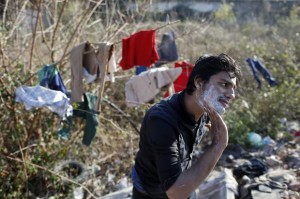Winter poses new dangers for migrants stranded in Balkans

A migrant shaves in front of an abandoned warehouse, in Belgrade, Serbia, Wednesday, Nov. 23, 2016. About 1,000 migrants occupied the rubbish-strewn sprawling complex in search for protection from cold and rain. —DARKO VOJINOVIC/AP
BELGRADE, Serbia — Mohammad Yassin says there are no words to describe the horror of migrant life in an abandoned warehouse in central Belgrade, home to hundreds of people trapped in Serbia en route to the European Union.
The 28-year-old former news reporter from Afghanistan has been squatting for days in the socialist-era concrete hall in the capital city, waiting for a chance to cross the heavily guarded borders of neighboring EU member states Hungary or Croatia.
About 1,000 migrants have occupied the rubbish-strewn sprawling building seeking protection from cold and rain. But the crumbling warehouse with no plumbing, wide glassless windows and gaping holes in the towering wooden roof has offered little shelter.
“We don’t have (a) proper place to sleep or to eat or to drink water, we don’t have warm water to take bath,” Yassin said. “We are suffering too much hardship … too much.”
Aid groups have warned that thousands of people like Yassin are scattered throughout the Balkans and in Greece, living in unheated tents, overcrowded camps and other substandard conditions that are becoming more inappropriate with the rapid advance of winter.
Article continues after this advertisement“Children, the elderly and other vulnerable people may die on European soil this winter unless urgent action is taken,” the International Rescue Committee said in a statement this week.
Article continues after this advertisementMany of the homeless migrants set out hoping to get to EU countries, but remain stuck along the former Balkans route — leading from Turkey through Greece, Macedonia, Serbia, Croatia and Slovenia — after nations closed their borders one after another in March.
While the sealed borders have reduced the influx, new migrants still have been pouring in illegally, guided along hidden paths by people smugglers to avoid border patrols. It usually takes weeks, or even months, before they manage to move on to their destinations in the EU.
Rados Djurovic, executive director of Serbia’s Asylum Protection Center, said up to 2,000 migrants have been living in parks and abandoned houses, in addition to several thousand — mostly families with children — staying in overcrowded refugee camps.
Djurovic said harsh living conditions and lack of hope have taken their toll on the migrants, who have become exhausted and irritable. They sometimes fight among themselves — one such clash in central Belgrade left one person dead and one injured this week.
“Bad weather and bad conditions have weakened them both psychologically and physically, they are stressed out and disoriented,” he said. “People feel abandoned and neglected, so tensions are rising.”
Earlier this month, a 9-year-old boy was rushed to intensive care from a warehouse in northern Greece after a cooking stove being used as for heating in his family’s tent caught fire, , IRC Country Director in Greece Panos Navrozidis said.
“Unless conditions improve, it is only a matter of time before another needless tragedy strikes,” Navrozidis warned.
Inside the Belgrade warehouse choking smells of urine and smoke mixed as groups of migrants sat by several small fires lit for warmth and cooking. Dozens of dusty blankets lined the concrete floor along with personal belongings in rucksacks or plastic bags.
Migrants have used old furniture or cardboard to divide the space for some privacy. Trousers, shirts and other laundry dry on ropes. Old shelves and drawers now are filled with the migrants’ meager property.
Some men were sleeping wrapped in blankets, wearing jackets, woolen caps and gloves. Others listened to music on cellphones or chatted, spreading food from a nearby supermarket on the blankets while trying to create a semblance of a meal in the decrepit space.
One migrant stripped half-naked, shivering as he washed himself with freezing water, a widening pool forming under his feet. Others lined up to wash dishes.
Many have become sick, infected with lice or skin allergies. Their condition has worsened further after government recently instructed aid groups to halt food deliveries outside official camps, hoping migrants would pull away from the streets.
Yet the building’s occupants have refused government offers to move to refugee camps where they could apply for asylum legally, fearing possible deportation or being sent to a camp that would push them even farther away from the EU’s borders.
“Camps are far from here, we can’t go there, we want to go to foreign countries,” said Najebullah from Afghanistan, who gave only his first name.
By one of the fires, 16-year-old Zabir Zahid said he has eaten nothing but potato and bread for weeks. He said he tried once to cross into Hungary, but was pushed back by the Hungarian police.
Still, Zahid said he is determined to reach Austria and never return to Afghanistan.
“In Afghanistan is fighting, I don’t like fighting,” he said. “I want a life, I don’t want to die.”